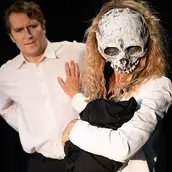
Her life resembles a gripping novel with many chapters: from Königsberg in the 1910s to her studies with Heidegger and Jaspers, the vibrant Berlin of the 1920s, her exile in Paris in the 1930s, to her escape, friendships, and intellectual life in New York in the 1950s and 1960s. The wars and totalitarian regimes of the 20th century profoundly shaped Hannah Arendt's thinking.
Her major political work, *Elements and Origins of Totalitarianism*, made her instantly famous in 1951. When Hannah Arendt reported on the Eichmann trial from Jerusalem in 1961 and described the defendant as a bureaucratic "buffoon," she sparked an intense debate. But Arendt remained steadfast – she wanted to get to the bottom of things, even if that meant "thinking where it hurts." For her, intellectual freedom was the highest good – she called it "thinking without railings."
American cartoonist and author Ken Krimstein, known for his work in The New Yorker and the Wall Street Journal, has impressively retraced Arendt's life in his graphic novel *The Three Lives of Hannah Arendt*.
Director Theresa Thomasberger brings this extraordinary biography to the stage as a poetic and political journey through the 20th century.
(IN ENGLISH)
Additional information
Participating artists
Ken Krimstein (Autor/in)
Theresa Thomasberger
Mareike Beykirch
Svenja Liesau
Abak Safaei-Rad
Daria von Loewenich
Julischka Eichel
Theo Steinbeck
Jakob Stöve
Dates
February 2026
| Mo | Tu | We | Th | Fr | Sa | Su |
|---|---|---|---|---|---|---|
1
| ||||||
2
|
3
|
4
|
5
|
6
|
7
|
8
|
9
|
10
|
11
|
12
|
13
|
14
|
15
|
16
|
17
|
18
|
19
|
20
|
21
|
22
|
23
|
24
|
25
|
26
|
27
|
28
|



